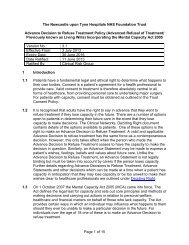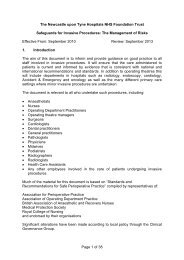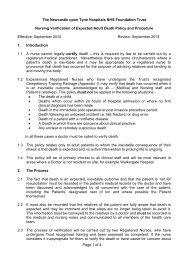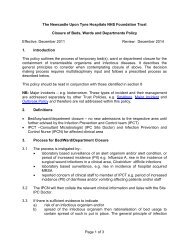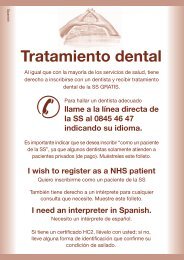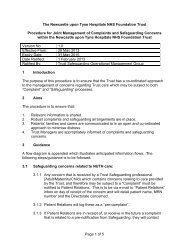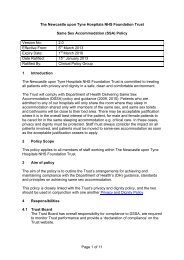Spring 2012 - Newcastle Hospitals
Spring 2012 - Newcastle Hospitals
Spring 2012 - Newcastle Hospitals
Create successful ePaper yourself
Turn your PDF publications into a flip-book with our unique Google optimized e-Paper software.
GPmatters<br />
Update for GPs from The <strong>Newcastle</strong> <strong>Hospitals</strong><br />
Bringing care closer to the people who need it is a key objective<br />
for <strong>Newcastle</strong> <strong>Hospitals</strong> and we remain committed to providing<br />
services in various locations across the region to help make access<br />
as easy as possible.<br />
We offer clinics in a<br />
range of district<br />
hospitals and health centres<br />
and are increasing our clinic<br />
portfolio in GP surgeries<br />
across the patch. In March<br />
we opened our ENT clinic<br />
at the Cestria Health Centre<br />
in Chester le Street and from<br />
April we will be offering<br />
Dermatology clinics<br />
throughout South Tyneside<br />
Benfield Park Healthcare<br />
and Diagnostic Centre<br />
We are delighted to<br />
announce that the<br />
Benfield Park Healthcare and<br />
Diagnostic Centre opened its<br />
doors on 5 th March <strong>2012</strong> and<br />
was officially opened by the<br />
Rt Hon Nick Brown MP on<br />
Friday 23 rd March <strong>2012</strong>, in<br />
the east of <strong>Newcastle</strong>. As we<br />
continue to progress our<br />
commitment to providing<br />
fully integrated healthcare<br />
in community and hospital<br />
settings, this exciting<br />
development supports our<br />
vision outlined in “Better<br />
Together” by working in<br />
partnership with a well<br />
established, local GP Practice<br />
to create a state-of-the-art<br />
health centre which offers<br />
access to primary, community<br />
and specialist services all<br />
under one roof.<br />
We hope you find our quarterly newsletters informative<br />
but if there is any issue you would like to see featured<br />
in a future edition, please let us know.<br />
Benfield Park Healthcare and Diagnostic Centre<br />
having been awarded the<br />
contract to work with GPs.<br />
See our quarterly article<br />
“Care Closer to Home”<br />
to keep up to date on where<br />
you can find our clinicians.<br />
Send your comments to<br />
gpmatters@nuth.nhs.uk<br />
Left to right: Sir Leonard Fenwick CBE,<br />
Rt Hon Nick Brown MP, Dr Paul Netts GP, Mr Kingsley Smith OBE<br />
From our point of view, this<br />
new health centre is about<br />
taking services closer to<br />
patients, as well as providing<br />
opportunities for primary and<br />
secondary care teams to<br />
collaborate on streamlining<br />
pathways of care. More on<br />
page 3.<br />
Also inside...<br />
Collaborative working<br />
Hadrian Primary<br />
Care Alliance<br />
New Walk-in Xray Service<br />
in the West of <strong>Newcastle</strong><br />
New Healthcentre opens<br />
on Benfield Road, <strong>Newcastle</strong><br />
ENT Clinic opens at the Cestria<br />
Health Centre<br />
Plus...<br />
Delivering Community<br />
Dermatology Services<br />
in South Tyneside<br />
MAGIC - Shared<br />
decision making<br />
Developing <strong>Newcastle</strong><br />
<strong>Hospitals</strong> Community Health<br />
Getting children home quickly<br />
Be Clear on Cancer<br />
Ensuring best 'End of Life' care<br />
At forefront of international<br />
ageing research<br />
GPmatters<br />
IssueSeven-March<strong>2012</strong><br />
Healthcare at its very best - with a personal touch
View from Primary Care<br />
- Hearty Lives <strong>Newcastle</strong><br />
Better Together continues to get better as more people get together.<br />
‘Hearty Lives <strong>Newcastle</strong>’<br />
was given its official launch<br />
at the Lemington Centre in<br />
January this year. This project<br />
aims to bridge the gap<br />
between secondary, primary<br />
and community care where<br />
lifestyle changes can help<br />
improve the outcomes of<br />
clinical intervention. Funded<br />
by the British Heart<br />
Foundation, and delivered by<br />
HealthWORKS <strong>Newcastle</strong> in<br />
partnership with <strong>Newcastle</strong><br />
<strong>Hospitals</strong> this demonstrates<br />
how bringing people with<br />
different skills and<br />
backgrounds together creates<br />
something greater than the<br />
sum of its parts.<br />
A shining example of such<br />
working in practice is a lipid<br />
clinic run weekly at the Royal<br />
Victoria Infirmary where<br />
patients are given a huge<br />
amount of information at the<br />
initial appointment and then<br />
required to substantially alter<br />
their lifestyle.<br />
About half of their excess<br />
cardiac risk can be reduced by<br />
- taking the ideal drug<br />
regimen the rest is down to<br />
diet, exercise, smoking<br />
cessation and a whole new<br />
way of living. With Health<br />
Trainers available in the clinic<br />
and following patients back<br />
into the community it is<br />
possible to encourage,<br />
explain, cajole and keep those<br />
at high risk of cardiovascular<br />
events on the straight and<br />
narrow. They act as<br />
cheerleaders counteracting<br />
shoddy articles in the tabloid<br />
press, boosting concordance<br />
and providing a support ‘buddy’.<br />
It was great to hear the health<br />
trainers enthusiastically<br />
describe how they had been<br />
able to change whole families’<br />
health behaviour and gained<br />
a deeper understanding of<br />
the whole picture working<br />
alongside specialists and<br />
dieticians in the clinic.<br />
This is a great way to work.<br />
Local councillors certainly<br />
got the message particularly<br />
as to how we can use it to<br />
close the gap in life<br />
expectancy between Gosforth<br />
and Byker - I expect new<br />
projects to emerge. If CCGs<br />
really are about working<br />
differently in the future we<br />
should expect to see them<br />
embrace these ways of<br />
working as mainstream<br />
rather than having to rely<br />
on charities, even those as<br />
excellent as the British Heart<br />
Foundation, to fill in the gaps<br />
with projects.<br />
Dr Mike Scott, GP Clinical<br />
Advisor can be contacted<br />
at mike.scott2@nhs.net<br />
Collaborative working<br />
Healthcare is complicated.<br />
Delivering the best care<br />
for patients requires good<br />
co-ordination and<br />
communication between<br />
primary care, hospital<br />
clinicians and often, services<br />
provided by the local<br />
authority. Of course, a great<br />
deal of all this exchange goes<br />
on daily between individual<br />
clinicians. But to ensure that<br />
the patient truly remains at<br />
the centre of everything that<br />
we do requires timely<br />
communication with all other<br />
organisations involved in the<br />
patient’s care, and we have<br />
therefore continued to<br />
strengthen our links and<br />
structures to ensure effective<br />
engagement with our<br />
partners.<br />
The Better Together way<br />
of working is now very well<br />
established and we hold<br />
monthly meetings between<br />
<strong>Newcastle</strong> CCG leads,<br />
our GP Advisors and Trust<br />
clinicians to discuss clinical<br />
issues and pathways for<br />
<strong>Newcastle</strong> patients.<br />
The Trust is the main<br />
secondary care provider for<br />
many patients in and beyond<br />
<strong>Newcastle</strong>, eg. urological<br />
services, dermatology, clinical<br />
immunology – to name a<br />
few. To discuss these and<br />
other clinical services and<br />
how they might be improved<br />
we also meet monthly, again<br />
on a Wednesday afternoon,<br />
with the CCG leads from<br />
North Tyneside, Gateshead<br />
and Northumberland. We<br />
look forward to continuing<br />
this work.<br />
Dr Nick Thompson, Consultant Gastroenterologist and Assistant Medical Director can be contacted<br />
at nick.thompson@nuth.nhs.uk<br />
Hadrian Primary Care Alliance<br />
<strong>Newcastle</strong> <strong>Hospitals</strong> are delighted to announce that they have entered into a partnership facilitated by Hadrian Primary<br />
Care Alliance (HPCA) – a forward thinking federation of primary care medical practices based in and around Tynedale.<br />
As a member of this Alliance, we will be seeking to work in collaboration with primary care in the delivery of clinical services,<br />
education, training and research.<br />
If you would like to find out more about this development then please contact either Bev Reid, Assistant Director,<br />
Business and Development at bev.reid@nuth.nhs.uk or Jill Mitchell, Managing Director for the HPCA at jillmitchell3@nhs.net.<br />
2
Western Dr.<br />
New Walk-in Xray Service<br />
in the West of <strong>Newcastle</strong><br />
The Westgate Diagnostic Centre based on the Campus<br />
for Ageing and Vitality (former <strong>Newcastle</strong> General<br />
Hospital) now offers a new Walk-In Service for plain film<br />
imaging, Monday to Friday for both adults and children.<br />
Patients can come along anytime from 9:00am to 5:00pm<br />
without an appointment but will need an authorised plain<br />
film x-ray request form.<br />
To find out more information you can contact<br />
Jean Chambers, Superintendent Radiographer on<br />
0191 282 5624 or the Westgate Diagnostic Centre<br />
on 0191 233 6161 and extension 22144.<br />
Westgate<br />
Walk-in<br />
Centre<br />
Lewis Drive<br />
A1<br />
Bank<br />
The Beacon<br />
Western Avenue<br />
Agricola Road<br />
Wingrove Road<br />
Wingrove Avenue<br />
Grainger Park Road<br />
Campus for<br />
Ageing and<br />
Vitality<br />
WESTGATE ROAD (A186)<br />
Dunholme Road<br />
Police<br />
Station<br />
Bentinck Road<br />
Westgate<br />
Diagnostic<br />
Centre<br />
Lynnwood Av.<br />
Brighton Grove<br />
Sydney Grove<br />
<strong>Newcastle</strong> City Centre<br />
Bowling<br />
NSPCC<br />
Belsay Pl.<br />
Callerton Pl.<br />
New Healthcentre opens<br />
on Benfield Road, <strong>Newcastle</strong><br />
Heaton Medical Centre (formerly of 37a Heaton Road) now<br />
provide GP and Nurse Practitioner services as Benfield Park<br />
Medical Group from their new home alongside a Retail<br />
Community Pharmacy Service and a wide range of outreach<br />
secondary services provided by <strong>Newcastle</strong> <strong>Hospitals</strong>:<br />
• Radiology (Plain X-ray and Ultrasound)<br />
• Audiology Assessment and Hearing Aid Repair Services<br />
• Pulmonary Rehabilitation<br />
• Women’s Health<br />
• Musculo Skeletal Clinics including: Hip and Knee<br />
Replacement (follow-up), Rheumatoid arthritis annual reviews<br />
• Pain Management Clinics<br />
• Paediatric Clinics<br />
• Podiatry<br />
• Pre-admission Assessment Clinics<br />
The Trust’s services will become operational over the next two<br />
to three months and referrals are welcome from all Practices via<br />
Choose & Book.<br />
The Practice has established extensive links with local voluntary<br />
groups and the wider “3rd Sector” to provide services such as<br />
Talking Therapies, Citizens Advice and Sure Start. There will also<br />
be support on returning to employment with a strong focus on<br />
preventing ill health.<br />
The new centre boasts a first class environment with high quality<br />
facilities and offers greater convenience to users with extended<br />
opening hours and excellent parking. We have worked closely<br />
with the WRVS to develop an innovative, volunteer led<br />
Community Transport Scheme for patients who experience<br />
genuine difficulty accessing the facility by public transport. This<br />
will become operational over the next few months.<br />
A café will also be available to those using the site.<br />
If you would like to find out more about the new Centre<br />
please contact Wendy Baker, NuTH Project Lead at<br />
wendy.baker@nuth.nhs.uk or 0191 223 1643 or Jonathan<br />
McCutcheon, Practice Manager, Benfield Park Medical Group<br />
at jonathanmccutcheon@nhs.net or on 0191 282 1010.<br />
ENT Clinic<br />
opens<br />
at Cestria<br />
Health<br />
Centre,<br />
Chester le Street<br />
<strong>Newcastle</strong>’s ENT clinicians now offer a new clinic<br />
at the Cestria Health Centre in Chester le Street,<br />
giving patients an alternative location for their outpatient<br />
appointments. The Trust has a long history of working with<br />
the Health Centre and supports one of their GPs – Dr Adam<br />
Douglas - who has a special interest in ENT and manages<br />
routine conditions such as ear infections.<br />
The new clinic, led by Mr Gerard Siou, who is local to<br />
the area and a Consultant ENT Surgeon at the Freeman<br />
Hospital, caters for both adults and children covering the<br />
majority of general ENT conditions and in particular Mr Siou<br />
welcomes referrals for two week wait cancer patients and<br />
head and neck lumps. Also as a member of the North East<br />
Paediatric Airway Service, Mr Siou is able to receive referrals<br />
for children with obstructive and noisy airways problems<br />
including paediatric head and neck lumps, liaising closely<br />
with paediatric colleagues at the Great North Children’s<br />
Hospital where required. There is also a comprehensive<br />
Audiology Service at the clinic.<br />
Mr Siou says: “We have introduced this convenient new<br />
location for our ENT service in partnership with the Cestria<br />
Health Centre, to provide people either living, or working<br />
in the Chester le Street area with quick and easy access<br />
rather than having to travel to a hospital.”<br />
The clinic is currently available once a week every Tuesday<br />
morning and patients can be referred via Choose & Book.<br />
If you would like to find out more about this clinic, please<br />
email Gerard.Siou@nuth.nhs.uk or contact Jean Applegarth,<br />
Directorate Manager for ENT Services on 0191 244 8516.<br />
3
Delivering Community<br />
Dermatology Services<br />
in South Tyneside<br />
<strong>Newcastle</strong> <strong>Hospitals</strong> have been awarded the contract<br />
to work with GPs and South of Tyne commissioners<br />
to provide a new community dermatology service at four<br />
centres throughout South Tyneside including Blaydon and<br />
Cleadon from Monday 2 nd April <strong>2012</strong>. Clinics will take place<br />
four times a week staffed by an experienced Consultant<br />
Dermatologist from the Royal Victoria Infirmary, a local GP<br />
working as a speciality doctor and a nurse specialising in<br />
dermatology.<br />
These clinics will offer an intermediate level of service<br />
between primary and secondary care keeping access time<br />
short for patients, and provide a quick response letter to GPs<br />
with advice for future management in primary care. Minor<br />
procedures will be carried out in clinic and prescriptions can<br />
be issued for up to a month where required.<br />
MAGIC – involving<br />
patients more in decisions<br />
about treatment and care<br />
Three primary care practices in the North East are working<br />
alongside clinical teams from <strong>Newcastle</strong> <strong>Hospitals</strong> to find<br />
the best ways of involving patients more in decisions about<br />
their care and treatment. The MAGIC* (making good<br />
decisions in collaboration) programme is supporting<br />
implementation of shared decision making (SDM), offering<br />
skills training and support methods and materials. A GP who<br />
is involved says:<br />
“…. my practice has changed and I’m surprised by how<br />
little ‘sharing’ I was doing previously. I now realise that most<br />
of my consultations focused around giving information but<br />
not necessarily entering into discussion or eliciting patients’<br />
values and preferences.”<br />
A series of patient awareness-raising materials including<br />
posters in consultation rooms and flyers in appointment<br />
letters encourages patients to ask ‘what are my options,<br />
what are the possible benefits and risks and how can we<br />
make a decision together that is right for me?’<br />
A short film featuring local patients ‘So just ask!’,<br />
is available on <strong>Newcastle</strong> <strong>Hospitals</strong>’ website under “Patient<br />
Guides” and in public areas in the Freeman Hospital and RVI.<br />
It is currently running in the participating general practices:<br />
• Collingwood Health Group in North Tyneside<br />
• Parkway Medical Group in <strong>Newcastle</strong> upon Tyne<br />
• Central Surgery in South Shields<br />
4<br />
Referral criteria include acute rashes for diagnosis, flare-up<br />
of chronic rashes eg. eczema in both adults and children,<br />
and advice for skin conditions not likely to need hospitalbased<br />
care such as acne, including patients who may need<br />
Isotretinoin.<br />
Please note that “two week cancer wait” patients or those<br />
likely to need secondary care, for example phototherapy or<br />
surgery for BCC are not suitable for these clinics.<br />
We plan to deliver a programme of education to help<br />
improve local dermatology care and hope to recruit local GPs<br />
(now out to advert on NHS jobs) to work in the clinics where<br />
we hope they will develop their knowledge by using<br />
teaching opportunities.<br />
We look forward to working together to develop this new<br />
model of care for people in South of Tyne with skin conditions.<br />
Patients can be referred to this clinic via Choose & Book.<br />
For more information about this new service,<br />
please contact Dr Janet McLelland, Clinical Director<br />
and Consultant Dermatologist at<br />
janet.mclelland@nuth.nhs.uk<br />
Ask 3 Questions<br />
Sometimes there will be choices to make about your healthcare. If you are<br />
asked to make a choice, make sure you get the answers to these 3 questions:<br />
Dr Dave Tomson,<br />
MAGIC primary care<br />
lead, worked with<br />
programme colleagues<br />
to develop EMIS codes<br />
that record shared<br />
decision making activity<br />
– these are now<br />
available to all EMIS<br />
users. One practice<br />
has focused on linking<br />
shared decision<br />
making with the<br />
management of longterm<br />
conditions.<br />
Other work shows<br />
potential to streamline care<br />
pathways from primary through secondary care.<br />
Evidence shows that patients do want more involvement<br />
in decisions about their treatment, and that shared decision<br />
making has clear benefits for all. There is more work to be<br />
done, and MAGIC Phase II is set to launch in May <strong>2012</strong>.<br />
If you want to know more about sh ared decision making<br />
and how it can benefit you and your patients, contact<br />
carole.dodd@nuth.nhs.uk<br />
what are my<br />
options?<br />
what are the possible<br />
benefits<br />
and risks?<br />
how can we make<br />
a decision together<br />
that<br />
is right for me?<br />
?<br />
We want to know what’s important to you<br />
www.making-good-decisions.org<br />
* The MAGIC programme is supported by The Health Foundation.<br />
http://www.health.org.uk/areas-of-work/programmes/shared-decision-making
Develo ping <strong>Newcastle</strong><br />
<strong>Hospitals</strong> Community<br />
Health<br />
Compact between <strong>Newcastle</strong> <strong>Hospitals</strong><br />
and <strong>Newcastle</strong> City Council for Community<br />
Services<br />
<strong>Newcastle</strong> <strong>Hospitals</strong> has always valued close partnership<br />
working with key partners such as GPs and <strong>Newcastle</strong><br />
City Council and these are particularly important as we<br />
continue to progress our transforming community services<br />
agenda. To underpin our commitment we have recently<br />
agreed a ‘Compact’ with the City Council, describing how<br />
we will work together, alongside a vision of what we aim<br />
to achieve.<br />
The ‘Compact’ states that we will “work together for the<br />
benefit of adults and older people in the city who require,<br />
or may require, health and social care services and support”<br />
and offers a “framework for partnership working to<br />
encourage integrated decision making, innovative,<br />
effective and user focussed service provision, achieve<br />
mutual outcomes and make effective use of resources.”<br />
Cathy Bull, Director of Adult Social Care explains “There is<br />
a noticeable momentum for change in <strong>Newcastle</strong> to<br />
improve integrated working across health and social<br />
care. The Compact represents the Council and <strong>Newcastle</strong><br />
<strong>Hospitals</strong>’ joint commitment to change and service<br />
redesign. We look forward to being part of new ways<br />
of working and are very pleased with the progress being<br />
made.”<br />
This means joint health and adult social care services that:<br />
• Are easy to access<br />
• Provide timely and integrated care to help people to<br />
remain at home and avoid hospital and long-term care<br />
• Promote independence<br />
• Support people to manage and direct their own ongoing<br />
health and social care needs.<br />
We will continue to work together at all levels to help<br />
develop our joint services and find ways of supporting front<br />
line staff to deliver better and more integrated care.<br />
Integrated<br />
continence<br />
pathways in<br />
<strong>Newcastle</strong><br />
Provision of well coordinated<br />
continence care<br />
is a specific recommendation<br />
in a number of recently<br />
published national policy<br />
documents. With the merger<br />
of <strong>Newcastle</strong>’s acute and<br />
community continence<br />
services in April of last year,<br />
our staff have grasped the<br />
opportunity to bring about<br />
improvements by developing<br />
a range of work streams to<br />
ensure delivery of effective<br />
and efficient continence care.<br />
A proactive working group<br />
involving a wide range of<br />
stakeholders, including GP<br />
colleagues, has facilitated<br />
many improvements such<br />
as a single point of referral<br />
to standardised continence<br />
assessment, diagnostic<br />
facilities and specialist staff<br />
ensuring that the right<br />
treatment plans are offered<br />
rapidly for bladder and bowel<br />
dysfunctions.<br />
Integrated working also<br />
allows our staff to identify<br />
opportunities for earlier<br />
interventions, such as<br />
establishing treatment<br />
programmes, reducing and<br />
preventing the onset of<br />
urinary tract infections and<br />
aiming towards prevention<br />
of stress incontinence by<br />
actively discussing bladder<br />
health care with young<br />
women and teenagers.<br />
Working closely together<br />
will help reduce emergency<br />
admissions associated with<br />
catheter care and ensure first<br />
line approaches are explored<br />
before pursuing surgical<br />
intervention. In the same<br />
vein, following conservative<br />
treatment led by a nurse or<br />
physiotherapist rather than<br />
long term use of containment<br />
products is much better for<br />
the patient and means cost<br />
benefits to the organisation –<br />
a ‘win – win’ situation for all.<br />
For more information about our Continence Services<br />
please contact either Jackie Rees, Nurse Consultant<br />
Continence Care at Jackie.rees@nuth.nhs.uk or<br />
0191 223 1323 or Alyson Laws, Specialist Nurse<br />
for Continence in the Community at<br />
alyson.laws@nuth.nhs.uk or 0191 238 0010.<br />
Working with GPTeamNet<br />
A recurrent feature in feedback we receive from GPs is to make<br />
it as easy as possible to refer patients to our services. We are<br />
working with the GPTeamNet service to provide practices with<br />
up to date information about referral routes and clinics including<br />
service descriptions, contact details, referral forms where<br />
appropriate and guidelines.<br />
GPTeamNet is an information management system currently used<br />
across the following Clinical Commissioning Groups and member<br />
practices in the North: <strong>Newcastle</strong> Bridges CCG, CareFirst CCG,<br />
Engage CCG, Durham Dales, Easington and Sedgefield CCG,<br />
Durham North CCG and Northumberland CCG.<br />
There are a number of clear benefits using the GPTeamNet<br />
service, the most obvious being immediate access to relevant<br />
and current details of all services in one place, but we hope that<br />
5<br />
by providing as much information as possible on this portal,<br />
there will be a reduction in duplicated effort and information<br />
but more importantly, patients will always be referred to the<br />
right service first time round.<br />
At this stage we are piloting the service information in our<br />
“Urgent and Open Access Clinics Bulletin”, working with<br />
colleagues in the <strong>Newcastle</strong> Bridges CCG to help establish the<br />
services they would like to “subscribe” to. As this project<br />
develops we will look to build upon the information we provide.<br />
We will keep you posted on further developments but<br />
in the meantime if you would like to discuss this in more<br />
detail please contact Bev Reid, Assistant Director for<br />
Business and Development at bev.reid@nuth.nhs.uk<br />
or on: 0191 223 1001.
Serving the North East<br />
GNCH GP Event Update<br />
On 14th December 2011, the<br />
Medicinema at the Great North<br />
Children’s Hospital (GNCH) again played<br />
host to over 40 GPs from both North and<br />
South of Tyne for a Child Health Update.<br />
This was a repeat of our extremely successful<br />
event held earlier in the year and is part of<br />
our continuing commitment to the<br />
educational development of all health<br />
professionals in our region. Attending<br />
GPs heard interactive talks on recent<br />
NICE guidance, child health surveillance,<br />
paediatric allergy and rheumatology, as<br />
well as a safeguarding update and an<br />
opportunity to explore our fantastic new<br />
facility. Feedback from the day was<br />
Getting children<br />
home quickly<br />
Ensuring children get back to normal<br />
home life quickly after a stay in hospital<br />
is a priority for our service and an initiative<br />
to prevent delays in discharges - in particular<br />
during the winter months - has been a key<br />
workstream for our staff.<br />
To help relieve bed pressures at Great North<br />
Children’s Hospital during busy winter<br />
period, a dedicated discharge zone was<br />
developed. This provides children who are<br />
ready go home with a dedicated area in<br />
which to receive quick, patient-centred<br />
attention including:<br />
• a copy of the GP letter<br />
• any prescribed ‘take home’ drugs with<br />
information about how to take their<br />
medication<br />
• symptoms to look out for and any<br />
actions to take when they get home<br />
The service is run by a qualified Children’s<br />
Nurse supported by a Health Care Assistant<br />
who are members of our award winning<br />
Children’s Acute Nursing Initiative (CANI)<br />
team. By engaging directly with ward level<br />
nursing and medical staff they ensure the<br />
children and their carers have the most up<br />
to date information.<br />
This new approach was initially set up as a<br />
overwhelmingly positive and included<br />
comments such as:<br />
“Excellent, engaging speakers”<br />
“Very helpful, practical information”<br />
“Really good informative day”<br />
We plan to follow this with an annual<br />
update in a larger venue and will<br />
advertise this widely later in <strong>2012</strong>.<br />
For more information,<br />
please contact Mark Anderson,<br />
Consultant Paediatrician<br />
Mark.anderson7@nuth.nhs.uk)<br />
pilot in 2010 to review and improve current<br />
practices and bring about more effective and<br />
cost efficient use of the paediatric acute<br />
inpatients beds as well as providing a better<br />
service for our young patients – put simply,<br />
everyone benefits.<br />
This service is based on Ward 2 at the Great<br />
North Children’s Hospital and is open from<br />
8:00am to 4:00pm Monday to Friday.<br />
For further information about<br />
this service please contact Emma<br />
Willey, Senior Sister at<br />
emma.willey@nuth.nhs.uk or<br />
Jocelyn Thompson, Community Matron<br />
at Jocelyn.Thompson@nuth.nhs.uk<br />
CHILDREN’S<br />
SERVICES<br />
We offer an<br />
extensive range of<br />
Children’s Services<br />
including:<br />
Local<br />
Community/general Paediatric<br />
medicine<br />
Dermatology<br />
Paediatric Emergency<br />
Medicine<br />
Regional<br />
Burns & Plastic Surgery<br />
Child Development Centre<br />
Endocrinology<br />
ENT<br />
Forensic Medicine –<br />
North and South of Tyne<br />
Gastroenterology<br />
General Paediatric Surgery<br />
Immunology<br />
Nephrology<br />
Neurology<br />
Oncology<br />
Ophthalmology<br />
Orthopaedics<br />
Paediatric Intensive Care<br />
Respiratory<br />
Rheumatology<br />
Regional/National<br />
Cardiology & Cardiothoracic<br />
Surgery<br />
National / International<br />
Cardio Pulmonary<br />
Transplantation<br />
SCIDS - Severe Combined<br />
Immunodeficiency Syndrome<br />
Bone Marrow Transplantation<br />
for Immunological Disorders<br />
6
Be Clear on Cancer –<br />
Beating Bowel Cancer<br />
In January <strong>2012</strong> the Government launched its first sustained<br />
national advertising campaign - Be Clear on Cancer:<br />
Bowel Cancer - to alert patients to the symptoms of bowel<br />
cancer. In pilot sites during early 2011 there was a<br />
significant rise of nearly 50% in suspected bowel cancer<br />
referrals - about one extra patient per practice per week -<br />
so we can all expect to see an increase in referrals.<br />
We anticipate most extra referrals will come in via the<br />
Cancer Waiting Time (CWT) or two week pathway, as<br />
a faxed referral and the number received will be closely<br />
monitored with additional clinics and endoscopy lists<br />
provided to ensure all cases are met within capacity. All<br />
referrals will be rapidly triaged to the nurse specialists for a<br />
decision on outpatient review or straight to colonoscopy and<br />
New Acute Oncology Service<br />
Patients always have direct<br />
access to clinicians at the<br />
Northern Centre for Cancer<br />
Care (NCCC) if acute<br />
problems arise. However,<br />
many patients present to the<br />
Emergency Department and<br />
Assessment Suite at the RVI<br />
with acute complications of<br />
their condition or side effects<br />
of their treatment, and people<br />
with previously undiagnosed<br />
cancer also come to us as<br />
emergencies. To ensure we<br />
can rapidly respond to these<br />
patients’ needs, we have<br />
developed a new Acute<br />
Oncology Service (AOS).<br />
Establishment of this new<br />
service follows the 2008<br />
NCEPOD report into 30 day<br />
mortality post chemotherapy<br />
which found that around<br />
half of admissions were under<br />
non-oncologists. As a result,<br />
the National Chemotherapy<br />
Advisory Group<br />
recommended provision of an<br />
AOS in all hospitals with acute<br />
admissions, to ensure early<br />
oncology input.<br />
The new team of Dr Chris<br />
Jones, Macmillan Consultant<br />
in Acute Oncology, and<br />
Macmillan Nurse Practitioners,<br />
Celia Murch and Julie-Ann<br />
Huggan, now provides this<br />
service, initially generously<br />
funded by Macmillan Cancer<br />
Support.<br />
7<br />
our newly appointed colorectal surgeon, Mr Ben Griffiths,<br />
now in post at the RVI, will be able to field some<br />
of the initial increase in clinical activity.<br />
For more information about<br />
the “Be Clear on Cancer:<br />
Bowel Cancer” Campaign go<br />
to www.nhs.uk/bowelcancer<br />
or www.bowelcanceruk.org.uk<br />
nhs.uk/bowelcancer<br />
If you would like more information about our bowel<br />
cancer services, please contact our Clinical Lead for<br />
Gastroenterology, Dr John Mansfield at<br />
john.mansfield@nuth.nhs.uk<br />
Prostate Brachytherapy – planting the seeds for a better treatment option<br />
Prostate seed brachytherapy is one<br />
of three NICE approved treatment<br />
options for early, localised prostate<br />
cancer, and an increasingly popular<br />
alternative to radical surgery and<br />
radiotherapy. Seeds - tiny capsules,<br />
the size of a grain of rice - containing<br />
the radiation are passed through fine<br />
needles and positioned directly into the<br />
prostate gland. The treatment has a low<br />
complication rate, and following a single<br />
overnight stay, most men find they are<br />
able to return to pre-treatment activities<br />
within a couple of days.<br />
Consultant Clinical Oncologist,<br />
Dr John Frew, was appointed to lead the<br />
service and has developed a one-stop<br />
assessment clinic where treatment is<br />
discussed in detail, and all necessary<br />
pre-operative evaluations completed.<br />
Ideal referrals include patients with<br />
active lifestyles* who are not suitable<br />
for major surgery and who wish to<br />
maintain sexual function*, and patients<br />
with smaller glands without severe<br />
urinary symptoms.<br />
<strong>Newcastle</strong> <strong>Hospitals</strong> has invested in<br />
the very latest technology (a top of the<br />
range ultrasound scanner and<br />
radiotherapy planning software) to<br />
ensure the implant process is performed<br />
to the highest standards.<br />
“We have brought together<br />
colleagues from Acute<br />
Medicine, the Emergency<br />
Department, Palliative Care,<br />
Oncology and Haematology<br />
to provide the best possible<br />
service for patients with acute<br />
cancer-related problems”,<br />
says Dr Jones. “By providing<br />
oncology advice and support<br />
as early as possible in the<br />
patient’s presentation, we<br />
aim to reduce the severity<br />
of complications and length<br />
of stay in hospital. We can<br />
also arrange fast-track<br />
oncology outpatient<br />
appointments to avoid the<br />
For further information or to refer a<br />
patient please contact Dr John Frew<br />
at John.frew@nuth.nhs.uk<br />
Prostate Brachytherapy Team<br />
*Studies have shown that prostate brachytherapy impacts less on patient quality of life than other treatment options, eg. incontinence and sexual dysfunction.<br />
need for admission. Whilst<br />
this service isn’t directly<br />
referable by GPs, we wanted<br />
to let them know of our<br />
existence and how we are<br />
making improvements for<br />
the benefit of acutely ill cancer<br />
patients.”<br />
If GPs need any advice at any<br />
time regarding an acutely ill<br />
patient, please contact the<br />
Consultant Oncologist on<br />
call at NCCC via the hospital<br />
switchboard<br />
0191 233 6161.<br />
For more information about our AOS please contact Dr Chris Jones,<br />
Macmillan Consultant in Acute Oncology at Christopher.jones3@nuth.nhs.uk
Ensuring the best ‘End of Life’ care<br />
- first line opioid of choice to change<br />
Subcutaneous injection of strong opioids is the preferred<br />
route of administration of analgesia in palliative patients<br />
where the oral route is not appropriate eg due to vomiting,<br />
difficulty swallowing, or at the end of life. For many years,<br />
diamorphine has been the preferred parenteral opioid<br />
of choice.<br />
However, during 2004, supply problems with diamorphine<br />
injection arose, and clinicians switched to a variety of<br />
alternative injectable opioids. When the supply problems<br />
resolved, many switched back to diamorphine, but others<br />
continued to use injectable morphine. (The cost of injectable<br />
morphine is currently one quarter of the price of injectable<br />
diamorphine). This has led to both being used across<br />
the region, across primary and secondary care, and is felt<br />
to represent a significance governance risk, especially when<br />
patients transfer between different care settings.<br />
Recognising these risks, palliative care clinicians across the<br />
North of England Cancer Network (NECN) have agreed that<br />
current practice should be revised, and propose that<br />
morphine should be considered the first line opioid of choice<br />
for use subcutaneously, (as well as orally) across primary and<br />
secondary care. The NECN palliative care guidelines are<br />
Get GP Matters<br />
newsletter electronically.<br />
To receive your electronic copy, please send your email address to:<br />
gpmatters.subscribe@nuth.nhs.uk<br />
currently being updated (due to be published April <strong>2012</strong>)<br />
and will include these recommendations.<br />
The date of the proposed switch across the region is 1st May<br />
<strong>2012</strong>. Specialist palliative care teams will be liaising with local<br />
prescribers to inform them. The <strong>Newcastle</strong> community specialist<br />
palliative care team will be sending out more information to<br />
<strong>Newcastle</strong> GPs and community nurses about the switch. Local<br />
pharmacies and out of hours service providers eg. NDUC, are<br />
also being informed. There will be planned education sessions,<br />
which will explain this in more detail.<br />
These sessions will also highlight other changes in these<br />
updated NECN palliative care guidelines including guidance<br />
for management of anxiety and depression in palliative<br />
patients, glucose management in those on steroids,<br />
management of diabetes towards the end of life, and<br />
management of symptoms at the end of life in those with<br />
significant renal impairment or failure. There will also be an<br />
updated opioid conversion chart.<br />
8<br />
For more details, please contact Dr Alexa Clark<br />
Consultant in Palliative Medicine at<br />
alexa.clark@newcastle-pct.nhs.uk<br />
<strong>Newcastle</strong> at the forefront of international<br />
research into ageing<br />
Longstanding collaborative working between <strong>Newcastle</strong><br />
<strong>Hospitals</strong> and the Faculty of Medical Sciences at<br />
<strong>Newcastle</strong> University (also known as <strong>Newcastle</strong> Biomedicine)<br />
has generated an outstanding reputation in many research<br />
areas, and resulted in the development of a Biomedical<br />
Research Centre (BRC) in Ageing on the Campus for Ageing<br />
and Vitality some five years ago.<br />
The BRC was required to apply for renewal of its status last<br />
year and the review panel was so impressed with its track<br />
record that <strong>Newcastle</strong>’s application was not only successful,<br />
but resulted in an overall award in excess of £21million over<br />
the next five years.<br />
These world-class NIHR research facilities place <strong>Newcastle</strong><br />
in an excellent position to tackle an ambitious goal - to<br />
comprehensively address the complex health care needs of<br />
the older person. Work will start in earnest from April this<br />
year and focus on three areas of biomedical research:<br />
• the ageing brain (dementia and stroke)<br />
• the ageing body (liver, heart and metabolic disease)<br />
• the ageing limbs (musculoskeletal disease)<br />
By developing new tests (biomarkers), researchers and<br />
clinicians hope to establish ways to make an early diagnosis<br />
of age-related diseases and monitor the effects of new<br />
treatments. This will enable us to achieve our over-arching<br />
aim of developing “personalised medicine for the older<br />
patient”, where the needs of the individual drive provision<br />
of healthcare to improve the quality of our later years.<br />
If you would like to find out more about the<br />
BRC and its work, please contact Professor<br />
Patrick Chinnery, Wellcome Senior Fellow in<br />
Clinical Science and Professor of Neurogenetics<br />
at patrick.chinnery@newcastle.ac.uk


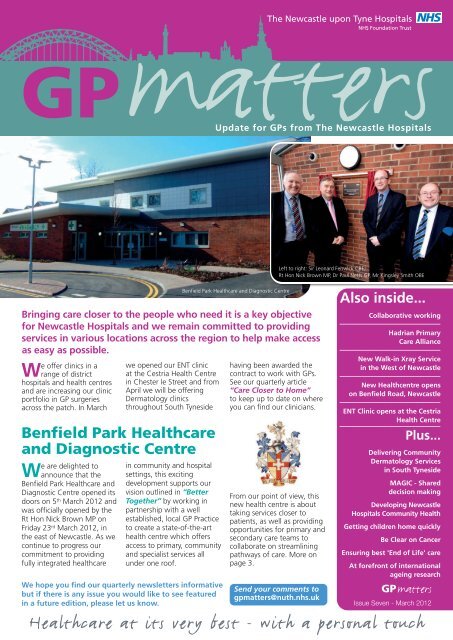
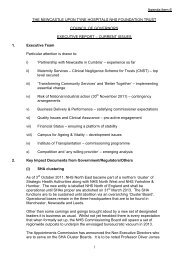
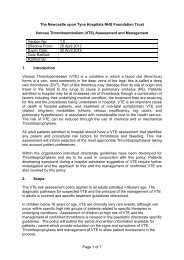
![Standard Precautions Policy - 112KB [PDF] - Newcastle Hospitals](https://img.yumpu.com/51150129/1/184x260/standard-precautions-policy-112kb-pdf-newcastle-hospitals.jpg?quality=85)
![Oxygen Management Policy - 38KB [PDF] - Newcastle Hospitals](https://img.yumpu.com/50798872/1/184x260/oxygen-management-policy-38kb-pdf-newcastle-hospitals.jpg?quality=85)
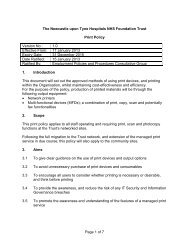
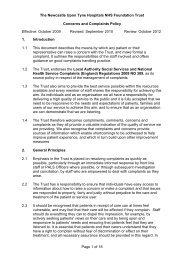
![Patient Identification Policy - 130KB [PDF] - Newcastle Hospitals](https://img.yumpu.com/49156101/1/190x245/patient-identification-policy-130kb-pdf-newcastle-hospitals.jpg?quality=85)
